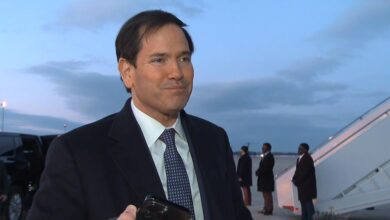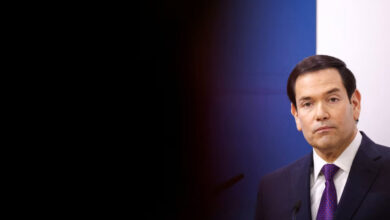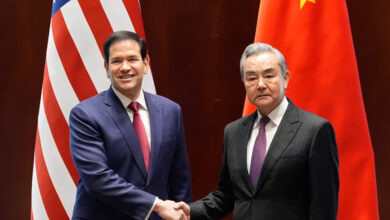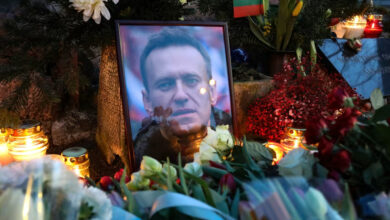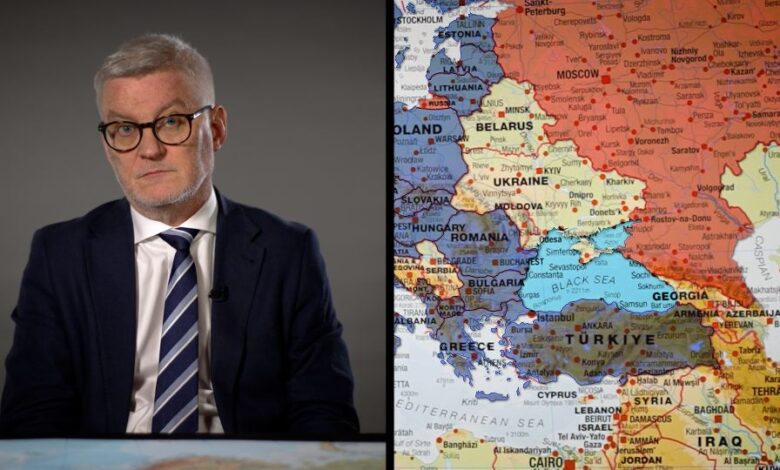
Peace is out of reach for Ukraine due to Russian President Vladimir Putin’s ongoing aggression, European defense ministers stressed Friday, even as the United States pushed ahead with talks with Moscow.
Top Trump administration official Steve Witkoff met Friday with Russian President Vladimir Putin, shaking hands with Putin at the start.
Putin and Witkoff were set to discuss Ukraine, Kremlin spokesman Dmitry Peskov said ahead of the meeting, which ended at 10 p.m. Moscow time (3 p.m. ET), according to Russian state media TASS.
Peskov had referred to the assembly as “a good opportunity” to convey the Russian position to Trump. A possible Putin-Trump meeting may also be on the agenda, state news agency RIA Novosti cited Peskov as saying.
“The painstaking work continues. Naturally, Witkoff, as a special representative of (US President Donald) Trump, will convey something from his president to Putin. Putin will listen to it. The conversation will continue on various aspects of the Ukrainian settlement,” Peskov said, state media TASS reported.
Witkoff, who is Trump’s foreign envoy, also met Friday with Russian negotiator Kirill Dmitriev in St. Petersburg, according to RIA Novosti. Dmitriev later described those discussions as “productive” in a post on X on Friday.
‘Russia is the sole cause of this war’
The US meetings in Russia come as Ukraine’s key allies gathered Friday in Brussels, where the defense ministers of the United Kingdom and Germany emphasized that Putin has continued his aggression against both military and civilian targets despite claiming to want peace.
The Ukraine Defense Contact Group meeting was co-hosted by the UK and Germany, with a noticeable absence at the table: US Defense Secretary Pete Hegseth, who only attended virtually.
The group of roughly 50 nations, which was created by former US Defense Secretary Lloyd Austin during the Biden administration, meets regularly to discuss bolstering military support for Ukraine.
“Given Russia’s ongoing aggression against Ukraine, we must concede peace in Ukraine appears to be out of reach in the immediate future,” German Defense Minister Boris Pistorius said in a news conference immediately after the meeting, speaking alongside the Ukrainian and British ministers.
“We will ensure that Ukraine continues to benefit from our joint military support. Russia needs to understand that Ukraine is able to go on fighting, and we will support it,” added Pistorius.
Ukrainian President Volodymyr Zelensky also made a virtual appearance, where he warned the past month had made it “completely clear” that “Russia is the sole cause of this war.”
He made explicit reference to Putin’s refusal to accept a US-proposed ceasefire in March. “Without strength against Russia, there will be no will in Russia to accept and implement any realistic and effective proposals for peace,” he said.
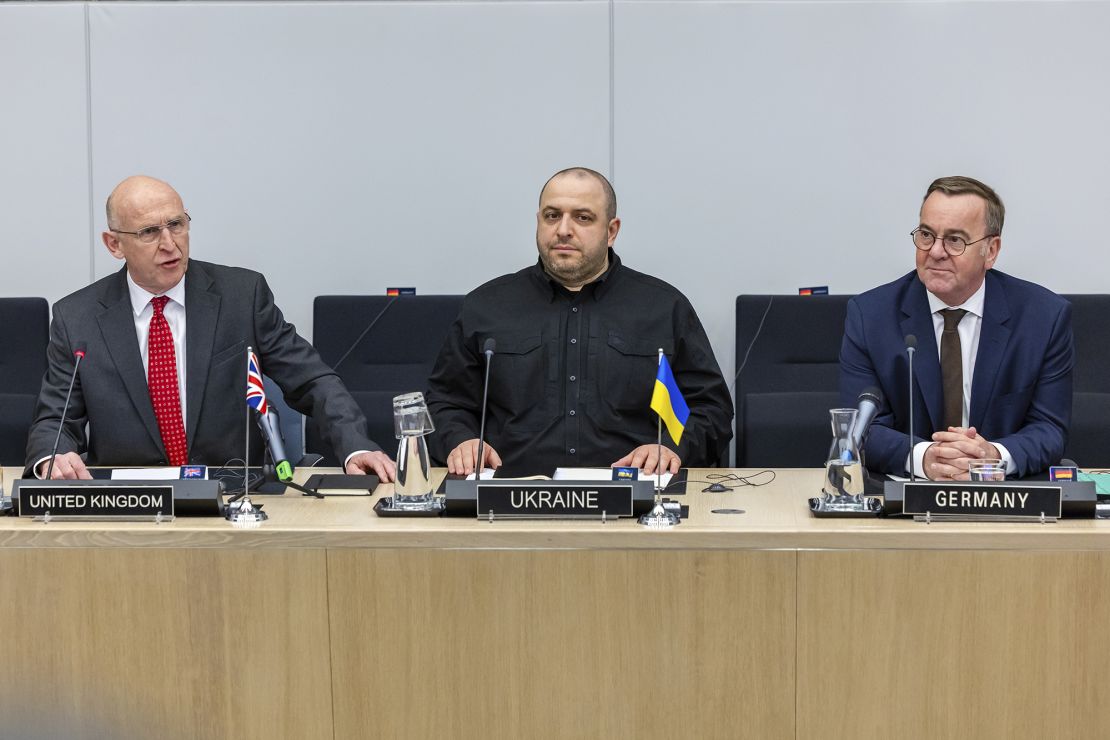
British Defense Secretary John Healey also noted that “today is one month to the day in which Russia rejected President Trump’s peace settlement.”
“Putin said he wanted peace, but he rejected a full ceasefire. Putin said he wanted peace, but he continues to drag his feet and delay negotiations. Putin said he wanted peace, but his forces continue to fire on Ukraine, military and civilian targets alike,” Healey said.
Friday’s meeting marks the first time a senior Pentagon official has not attended in person since the group was established in 2022 just months after Russia’s full-scale invasion of Ukraine, which comes amid a series of policy shifts by the Trump administration seen as moving closer to Moscow.
It came as Trump’s envoy to Ukraine suggested Kyiv would have to cede its eastern territories to achieve a peace deal with Moscow, in remarks that would likely alarm Western allies and leaders in Kyiv.
General Keith Kellogg, a former national security adviser, said Ukraine could be divided “almost like Berlin after World War Two,” in an interview with British newspaper The Times, published Friday. British and French troops could engage zones of control in western Ukraine as part of a “reassurance force,” with Russian troops occupying the east, he added. Kyiv’s forces would line the space in between, alongside a demilitarized zone, he said.
In a post on X, Kellogg later said that he had been referring to potential “zones of responsibility for an allied force” rather than the partitioning of Ukraine, and emphasized that the idea did not foresee US troops on the ground.
Witkoff, another senior Trump aide, has touted the view that Ukraine would need to give up the four regions – Donetsk, Luhansk, Zaporizhzhia and Kherson – to see an end to the war, indicating a stunning policy departure from the previous administration.
‘A matter of priorities’
Germany’s Pistorius said ahead of the Brussels meeting it was the Trump administration’s decision to attend virtually and was “not his business” to comment on the signal that sends.
“It’s not a matter of priorities. I think it’s a matter of schedules,” Pistorius added.
Ahead of the meeting, the British defense minister offered strong words of support for Ukraine and called for putting “even more pressure on Putin.”
“Our commitment is to put Ukraine in the strongest position to protect Ukraine’s sovereignty and deter future Russian aggression,” Healey said in a statement.
New pledges of military aid announced after Friday’s meeting total more than €21 billion euros ($23.8 billion), Healey announced, calling it “a record boost in military funding for Ukraine.”
Germany will provide a further €11 billion ($12.5 billion) in military support to Ukraine through 2029, including IRIS-T mobile air defense missile systems and PATRIOT missiles, Ukraine’s defense minister said Friday from Brussels.
The United Kingdom and Norway will also jointly give an additional $589 million in military aid, to provide maintenance to vehicles, radar systems, anti-tank mines and hundreds of thousands of drones.
Air defense is Kyiv’s priority, Zelensky said ahead of the meeting.

“We just need to address the shortage of air defense systems to make our sky protection stronger,” Zelensky said. “Our partners can help with this and also speed up the implementation of all agreements reached earlier. Patriots that remain unused in storage with our partners should be protecting lives.”
Zelensky said earlier this week that Russia was “preparing” a new offensive, as CNN reported that Russia’s army has increased operations across the front line in recent weeks.
Ukraine’s military chief Oleksandr Syrskyi told Ukrainian media on Thursday that Russia has “already begun” its new offensive against the Sumy and Kharkiv regions.
Meanwhile, a new United Nations report revealed this week that Ukraine experienced a significant increase in civilian casualties from Russian attacks in March.
The number of civilian casualties was 50% higher than the previous month, with at least 164 people killed and 910 injured in March, the UN Human Rights Monitoring Mission in Ukraine said.
Correction: An earlier version of this story incorrectly stated that Friday’s meeting was the first without a US defense secretary present. It is the first that a senior Pentagon official has not attended in person.
CNN’s Mariya Knight, Matthew Chance, Svitlana Vlasova, Clare Sebastian, Catherine Nicholls and Nick Paton Walsh contributed to this report.

